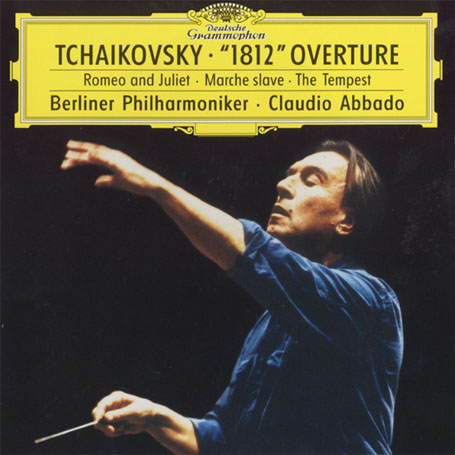Tchaikovsky Orchestral Works
View record and artist detailsRecord and Artist Details
Composer or Director: Pyotr Ilyich Tchaikovsky
Label: DG
Magazine Review Date: 6/2000
Media Format: CD or Download
Media Runtime: 69
Mastering:
DDD
Catalogue Number: 453 496-2GH

Tracks:
| Composition | Artist Credit |
|---|---|
| (The) Tempest |
Pyotr Ilyich Tchaikovsky, Composer
Berlin Philharmonic Orchestra Claudio Abbado, Conductor Pyotr Ilyich Tchaikovsky, Composer |
| Marche slave, 'Slavonic March' |
Pyotr Ilyich Tchaikovsky, Composer
Berlin Philharmonic Orchestra Claudio Abbado, Conductor Pyotr Ilyich Tchaikovsky, Composer |
| Romeo and Juliet |
Pyotr Ilyich Tchaikovsky, Composer
Berlin Philharmonic Orchestra Claudio Abbado, Conductor Pyotr Ilyich Tchaikovsky, Composer |
| 1812 |
Pyotr Ilyich Tchaikovsky, Composer
Berlin Philharmonic Orchestra Claudio Abbado, Conductor Pyotr Ilyich Tchaikovsky, Composer |
Author: Ivan March
Tchaikovsky's Tempest is a flawed work nevertheless offering imaginative moments, impressive orchestral colouring and a magnificent love theme - perhaps the most intense expression of passionate ecstasy that Tchaikovsky ever wrote. The even greater melody for the star-crossed lovers in Romeo and Juliet has an extra, tragically noble dimension, making it unique in the composer's output. By encouraging glorious playing from the Berlin Philharmonic, Abbado gives the Tempest theme its full due: it is introduced with touching delicacy (8'46'') and its final climactic reappearance (19'01'') explodes with passion. The atmospheric opening, its soaring horn theme evoking Prospero's enchanted island and the sea, is beautifully played, and the rumbustious storm sequence (not perhaps Tchaikovsky at his finest) is vigorous and exciting.
Curiously, though, when it comes to Romeo and Juliet, a much greater work, Abbado's spacious approach is less successful in achieving a consistent ongoing tension, surprising since these are live performances. When that magical harmonic shift introduces the love theme (7'01'') the playing is touching and tender, but one does not hold one's breath in anticipation as one does with Karajan's superb Vienna Philharmonic account and, as the veiled moonlight sequence creeps in, Abbado is even more withdrawn and gentle. The hushed string playing is very lovely, but the concentration is not quite sustained at the highest level. Later the feud battle sequence is really exciting, capped by the thrilling return of the Friar Lawrence theme on the trumpets (12'53''), but overall there is an element of disappointment here.
The Marche slave, too, opens very spaciously, but is underpinned by a surprisingly profound sense of melancholy; again the performance works up a full head of steam and the coda is sensational. So is the end of the 1812, which includes superbly placed canon shots that all but dwarf the orchestra; it's a performance that is most satisfyingly held together. Abbado, mindful that it's a tuneful, well-structured, but episodic piece, not only prevents the seams from showing, but also maintains the forward momentum admirably. The brilliant, full-blooded recording is excellent, only just short of demonstration standard.
'
Curiously, though, when it comes to Romeo and Juliet, a much greater work, Abbado's spacious approach is less successful in achieving a consistent ongoing tension, surprising since these are live performances. When that magical harmonic shift introduces the love theme (7'01'') the playing is touching and tender, but one does not hold one's breath in anticipation as one does with Karajan's superb Vienna Philharmonic account and, as the veiled moonlight sequence creeps in, Abbado is even more withdrawn and gentle. The hushed string playing is very lovely, but the concentration is not quite sustained at the highest level. Later the feud battle sequence is really exciting, capped by the thrilling return of the Friar Lawrence theme on the trumpets (12'53''), but overall there is an element of disappointment here.
The Marche slave, too, opens very spaciously, but is underpinned by a surprisingly profound sense of melancholy; again the performance works up a full head of steam and the coda is sensational. So is the end of the 1812, which includes superbly placed canon shots that all but dwarf the orchestra; it's a performance that is most satisfyingly held together. Abbado, mindful that it's a tuneful, well-structured, but episodic piece, not only prevents the seams from showing, but also maintains the forward momentum admirably. The brilliant, full-blooded recording is excellent, only just short of demonstration standard.
'
Discover the world's largest classical music catalogue with Presto Music.

Gramophone Digital Club
- Digital Edition
- Digital Archive
- Reviews Database
- Full website access
From £8.75 / month
Subscribe
Gramophone Full Club
- Print Edition
- Digital Edition
- Digital Archive
- Reviews Database
- Full website access
From £11.00 / month
Subscribe
If you are a library, university or other organisation that would be interested in an institutional subscription to Gramophone please click here for further information.




